


Winning starts with what you know
The new version 18 offers completely new possibilities for chess training and analysis: playing style analysis, search for strategic themes, access to 6 billion Lichess games, player preparation by matching Lichess games, download Chess.com games with built-in API, built-in cloud engine and much more.
It is better to be first in the village, than second in Rome!
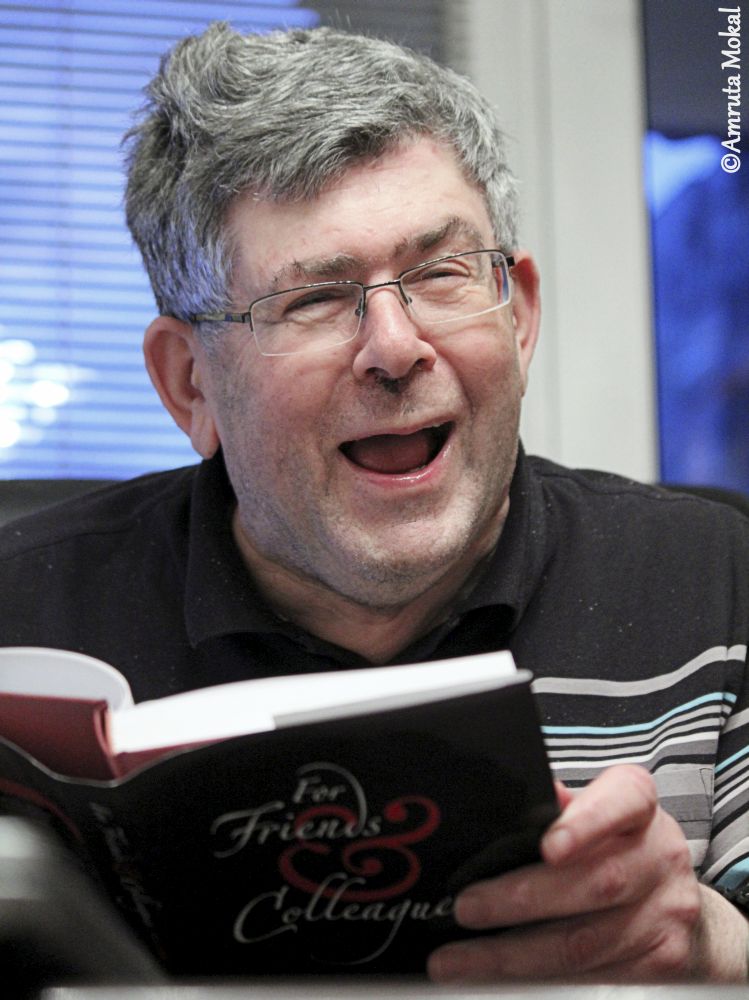
Mark Dvoretsky (09.12.1947 - 26.09.2016)
It was 15th of March 2016, the fourth round at the Candidates tournament 2016, Moscow. Sitting in the press room, I was working on the analysis of the four games that were in progress. Suddenly I noticed Amruta (my wife), who was busy taking pictures, making a dash into the press room. With heavy breath and great excitement, she blurted, "He is here, he is here, come quick!" I left all my work. I knew who had entered into the tournament venue. Before coming to Moscow, Amruta and I had decided that if any of us saw Mark Dvoretsky we would leave whatever it was that we were doing, no matter how important, and spend maximum time with the legend.
When I was around 2200 and unable to make tangible progress in chess, it was Dvoretsky's books that came to my rescue. He taught me how every sound idea had to be backed up with variations. He asked questions which made me think deeply about the game, and his didactic answers almost always cleared my doubts. This man who had helped me become a strong chess player and in general improved the quality of not only my chess understanding, but also my life, was now sitting right in front me, in person. He was alone in the spectator's area, staring at the big screen projecting the games. I went up to him and introduced myself in a way that many people must have done to him in the past: "Hi Mark, I have read almost every book that you have ever written and I am a big big fan of your work." Mark smiled and replied in a calm manner. I immediately started to feel comfortable and we discussed the game between Karjakin and Anand that was going on. "It's an extremely difficult position for Black to defend," said Mark. He had looked at the position for only a few seconds, but he understood it quite well. That turned out to be Anand's first loss to Karjakin in any format.
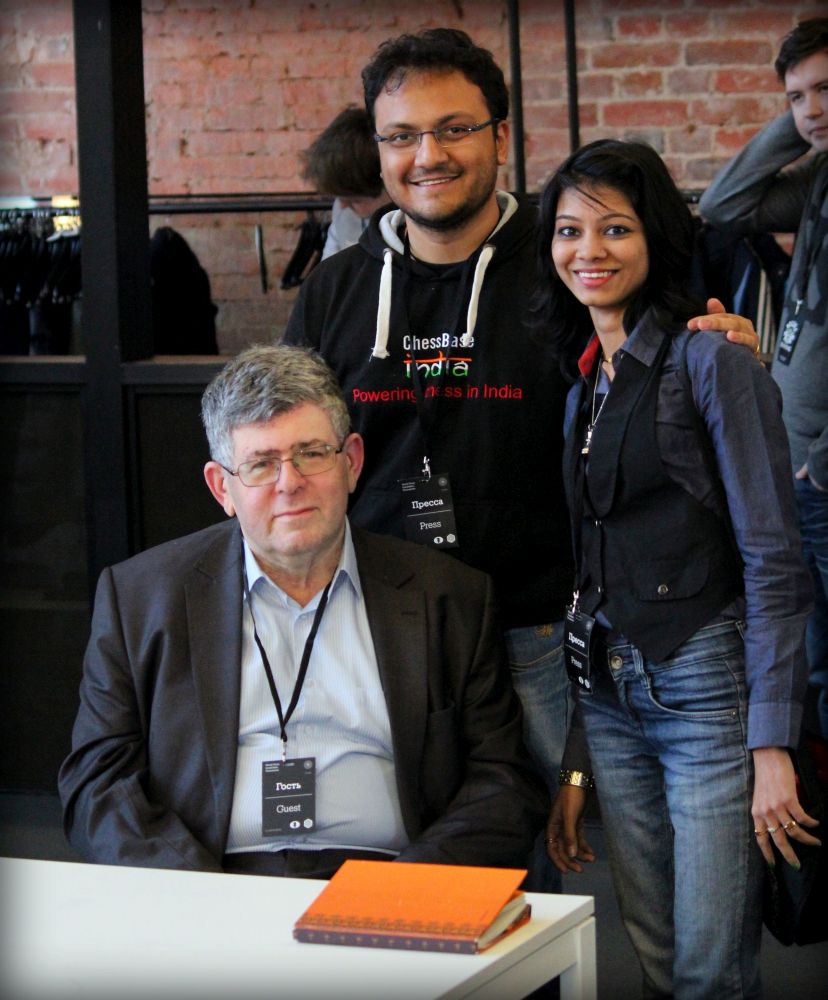
It was a dream come true for both me and Amruta to have a picture with Mark Dvoretsky
As I stood with Mark, a lot of people came and greeted him. It was difficult to have a serious conversation in this environment. Hence, I asked him whether he would be fine if we met at his apartment for an interview for the ChessBase newspage. It came to me as a great surprise that Mark didn't hesitate for a second. "Sure, why not." He took out the visiting card from his pocket, "Contact me a day before you would like to come."
As the ninth round came to an end, I called Dvoretsky. "Mark, tomorrow is a rest day at the Candidates. Can we meet at 5 p.m.?" He replied positively and on the 22nd of March Amruta and I got ready to go to Tallinnskaya street in Moscow to do an interview with the famous Mark Dvoretsky.

The neighbourhood of Talinnskaya where Mark lived

After half an hour of searching we finally located his apartment
Mark greeted us warmly and took us to his study. It was a perfect place to work in peace. Absolute quiet, well lit, the desk was littered with books and a computer, which Dvoretsky had to reluctantly use. He sat in his chair with a smile as I gathered everything around me. I was in the room of one of the greatest chess trainers and authors of all time. I asked him the first question and he replied with energy and enthusiasm. Seconds turned into minutes and minutes into hours as I spoke with Mark for nearly three hours. Amruta took pictures of his every emotion. One of the features of Mark's interview was the ease with which he would answer the questions. No matter how deep it was, he answered immediately. Chess was second nature to him, and this was clear from his replies.
Due to my personal commitments and a huge chess trip I couldn't work on this interview immediately. After coming back from my 90 day Europe trip, I started carefully transcribing the audio files. And while I was working on this interview I received the news of his death. Here I had been listening to his voice for hours on end, and there in Moscow Mark was no more. It will be my regret that he will not be able to read this interview, but I hope I will be able to make the readers understand what made Dvoretsky special and why was he one of the best trainers and authors who ever lived.
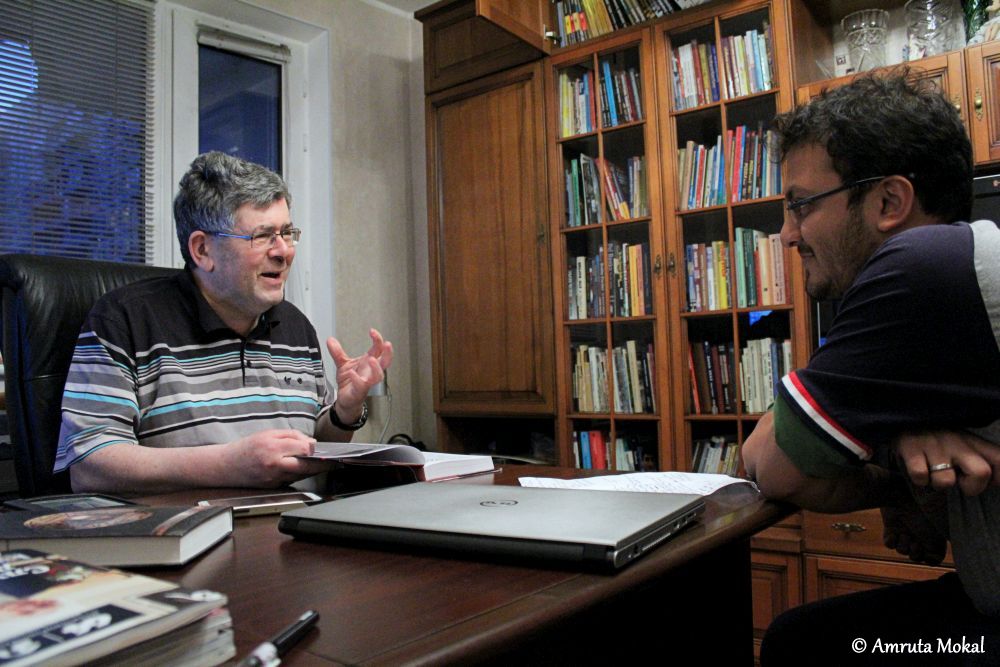
Rapt with attention as the maestro speaks
Sagar Shah (SS): Mark, everyone knows you as a great trainer and an author. But tell us about your beginnings. How did you start playing chess?
Mark Dvoretsky (MD): I learnt the rules of chess even before I became a school boy. I was around five or six years old. However, I started to study chess seriously and participate in tournaments only when I was in the fifth grade. Before that I had a different interest – mathematics. One fine day our math teacher was changed and a very boring one was the replacement. I lost my interest in the subject and I moved towards chess. I was around 11-12 years old when I enrolled myself in a chess club in Moscow. I succeeded in becoming a master by the end of my school. It wasn't bad, but not too great by today’s standards. Just to give you an idea of how things were back then, when I finished my school I played for the Soviet team in the match against Scandinavia on the fourth board. Karpov played on board seven!

A young Mark Dvoretsky
At the start of my University I was a weak master. When we finished University I got a diploma in mathematics and economics. It was then that I started to teach chess in the Faculty of Institute of Physical Culture. Once I made this switch my results started to improve in chess. I practically did not work on my own game, I just taught others. But it was enough.
SS: What were your initial successes as a trainer?
MD: My first serious student, Valery Chekhov, became the World Junior Champion in 1975. Two years later it was Yusupov and then Dolmatov. It was amazing because the Soviet Union started sending players to Junior Championships from 1950s onwards. Until 1970s, that’s 20 years, they had only three World Junior Champions - Spassky, Karpov and Beliavsky. And as a coach I prepared three more champions in four years! [laughs] The surprising thing is that this training not only helped my students but also made me into a really strong player. For many years I was the strongest master in the world according to rating. I was around 35th in the Elo rating list by the time I was 30 years old!

While working with the juniors I was also training senior players like Nana Alexandria who competed in two World Championship Matches. Unfortunately she never won the title. Soon these juniors grew up and I helped them in important matches, like the Candidates and other events.
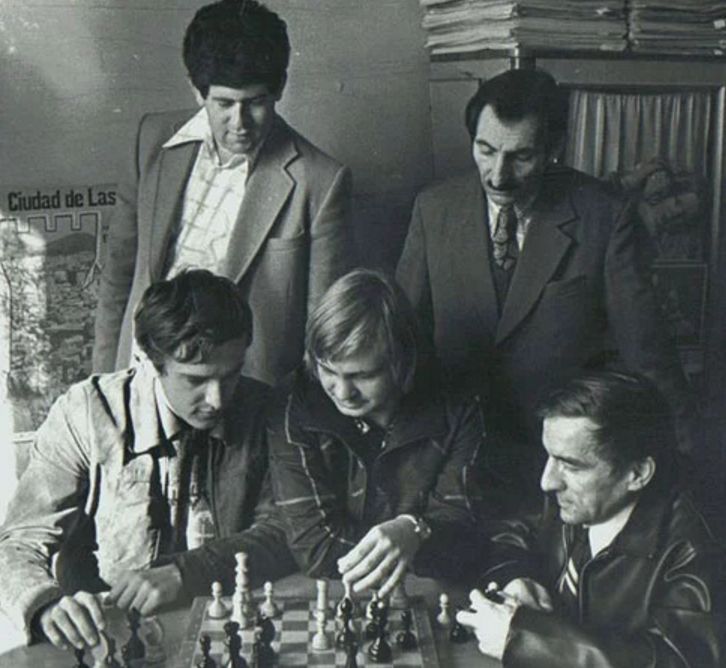
Dvoretsky looks on as his students Dolmatov and Yusupov analyze (picture from Dvoretsky's private collection)
SS: How did you create such strong players? What were the secret ingredients?
MD: Several elements. I understood right from the very beginning that some methods of training work are reasonable, rational and can bring success. Before starting to train I read a lot of chess books, mainly Russian. So, I had a good chess education.
Second, I believe that a trainer can be successful if he really likes his work. He wants not his own success, but the success of his students. It's the natural stimuli for work. Not money, not anything else. And I always had it. I became very good friends with all my students and we have always remained that way.

Thirdly, I think common sense is very important. I had good general education from the University and before that I studied in the mathematical school. So, I could analyze well and feel what the most rational way was in a given situation. The simple logic which I used for chess worked well. I always wondered why this simple logical thinking is not so common! [Laughs]
For example, a game of chess is a long battle. You will most certainly not be successful in winning the game most of the time in the opening. It makes sense to study the middlegame and endgame as well. The opening is just a part of the work, but many trainers they dedicate all their time to it. I focused on all the phases of the game for my students and this led to a much more harmonious development. This is especially true for young players. When we deal with Kramnik or Carlsen, we can see that they are good in all other areas, so for them opening becomes extremely important. Even for them it is not exactly true, but when you work with young players, who have a lot of weaknesses, there are much more promising areas of improvement, areas which bring more success.
And lastly, I feel that many chess trainers think that chess is a game based on information. They try to collect data from various sources, learn them and then teach it to their students. But we mustn't forget chess is also a sport and to be successful at a sport it is not enough to just have knowledge, you should have skills too. And for the development of skills you need to train. This is absolutely normal for any sport. It is also true for a subject like mathematics. You not only remember a lot of formulae and theorems, but you also solve a lot of problems. Therefore, training was a permanent part of my work with the students. If I gave them some knowledge, we would simultaneously train to understand it much better. There are many skills in the game of chess, like combinational vision, attack, defence, etc. and I always worked on these areas with my students. It's absolutely natural and common sense, not a deep discovery!
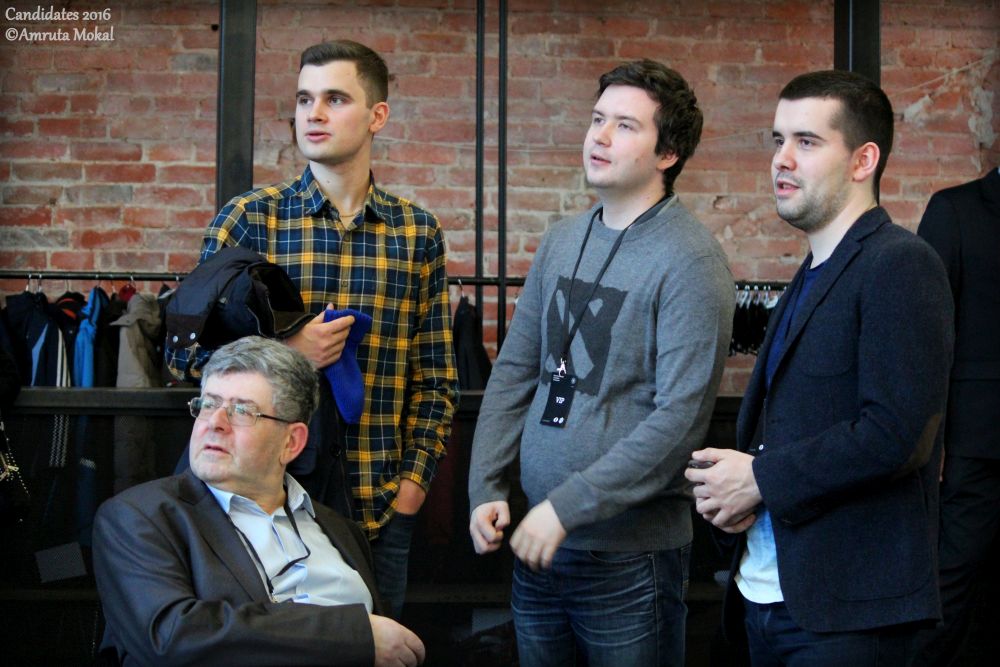
That’s respect: three of the most talented Russian youngsters, Maxim Matlakov, Ildar Khairullin and Ian Nepomniachtchi, analyze a position with Mark Dvoretsky at the Candidates 2016
SS: What is natural for you is not so easy for many trainers because the training material is not so easy to create.
MD: It's just a continuation of this logic. For example: if I want to train, I need to use very good material for that purpose. From the very beginning of my work I started collecting many training positions. I could open a book and demonstrate something from that, but that could be done by anyone sitting at home. Hence, I tried to collect original positions and use different material for different training purposes. [ While saying this Mark opens his drawer and shows his card files]
SS: Wow! These are the Dvoretsky's famous card files.
.jpg)
Mark shows me his collection of card index files. Essentially it's like a post card with a position on it. Mark has hundreds of such cards arranged based on different themes.
MD: Yes, these are my card files. I have them in computer format also. I have arranged them based on topics like manoeuvring, prophylaxis, exploiting an advantage, training of intuition, gaining counter chances, imagination, comparisons, etc. I write the initials of the players on each card file to know who have solved them already. For example here you can M,I,Z. That's Motylev, Inarkiev and Zviagintsev.
This is only part of my collection. All this has been preserved right from the time I first started training. It was very important to think about the form in which I would keep this material so that I would avoid duplication, and also it would make it easier for me to rectify positions which contained errors. So look here – I have ten positions on the page. If something is wrong I still have space for two more. In this way on every sheet of paper, I will always have ten positions related to a topic.
SS: [I looked at all the hand-made drawings on paper] Did you draw all of these positions?
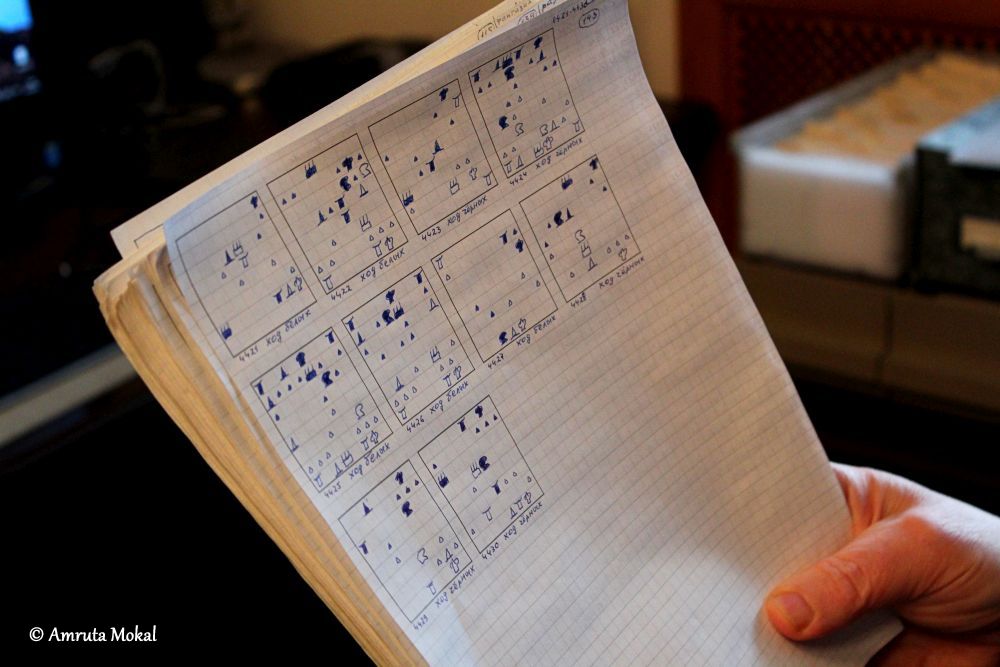
Ten positions in one page and all drawn by hand!
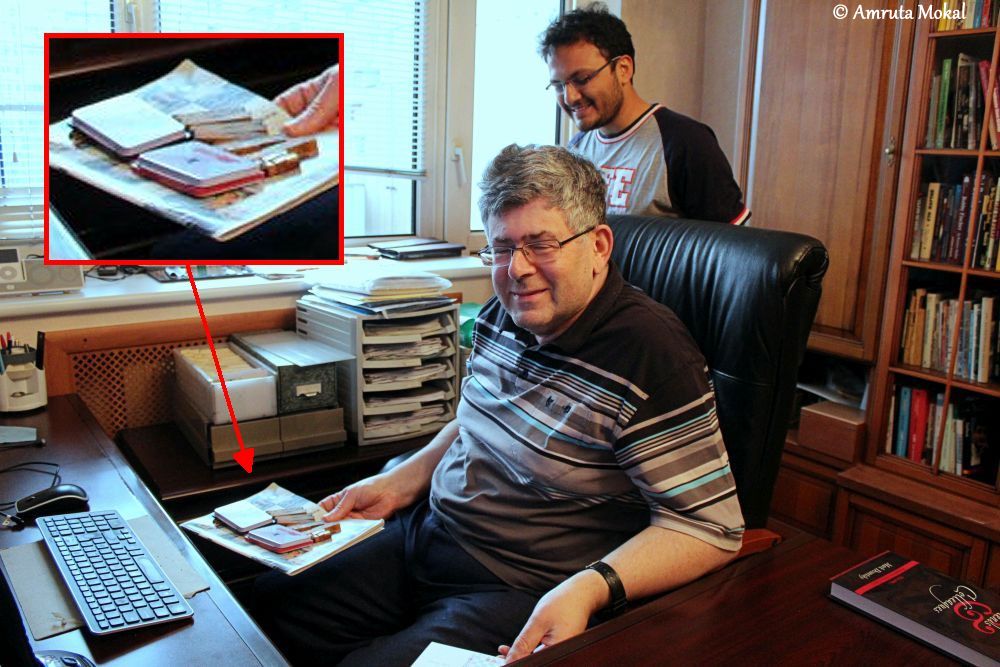
The small stamps are what Mark uses to make the above diagrams
MD: Yes, of course, this is done by me. Nowadays I save them simultaneously in the computer as well, but paper is very useful when I have to go to some place. I just carry a couple of them with me and I can give a good lecture!
SS: But isn't it possible to just print out from the computer? Why should you undertake the hardship of drawing all of these by hand?
MD: Yes, it's possible, but I am not sure there is any way to get it in the format that I would like. I want four positions in a row and ten in one page. I don’t think there are any settings to achieve that. Hence, I continue doing it by hand.

A view of Mark's study room where the interview took place
SS: How do you start working with a student who comes to you? What is the initial step?
MD: Different approaches for different players. It is important to see what his strengths and weaknesses are, and what is it that we would like to work on. A typical way to begin is with the diagnosis. Sometimes he sends me games beforehand, or sometimes we discuss his games, or we just analyze something. While doing this work I am trying to figure out his weaknesses and get to know things about his personality. And then when I spot a recurring problem our work usually begins from this point onwards. Also, it happens quite rarely that a completely new guy comes to me. I usually work with players whom I have seen before or analyzed a few of their games, so I already know a thing or two about them.
SS: Once the diagnosis is done and you have located the weaknesses, then you use your card index to give him positions?
MD: Not always. Sometimes we work on some game from the starting position, analyze it together. Sometimes I give him homework to study some article or book, which I know is of a high quality and will benefit him. But it is not sufficient to only find what the student's shortcomings are. It is also important to find out the reason why specific mistakes are being made. In this aspect it helped me a lot that I was a strong over-the-board player.

The spark in the eye was there until the very end! Mark's strength as a player helped him in his trainings

SS: You were definitely very strong as a chess player. And if you would have devoted time to your play you would have become a high class grandmaster. As things stand, you did not complete your GM title and are still an IM. Does this give you feeling of incompleteness?
MD: I didn't worry about this fact. It was Soviet times. The opportunity to play norm tournaments in foreign countries was very limited. I once got a chance to play in a foreign country and I played poorly because of bad form. But on the whole I do not think too much about the GM title. I was ranked 35th in the world and if I worked hard I would have reached somewhere around the 20th position. I understood that no matter how hard I tried I would not be able to become World Champion or fight for the highest title. You know this famous saying, right [laughs]: It is better to be first in the village than second in Roma [Rome]. Sure, training work was less profitable and less prestigious, but I understood immediately that here I can be more successful than anyone else. Hence, I dedicated my life to training others.

SS: In all these years that you have trained others, who has been the most talented one according to you?
MD: My most successful student was Artur Yusupov. He was ranked number three in the world. But most talented was definitely Alexey Dreev. His talent was not less than Kasparov or Karpov. When he was young, his results were also better than Kasparov's results. Kasparov became a Soviet Master when he was 15. Dreev became one at 13! And he didn't have the support that Karpov or Kasparov received. When Dreev played the World Cadets Championship under-16 twice, he was 14 and 15 years old. He won both of them. He didn't lose any games. Kasparov didn't win both his Cadet Championships. There was no doubt that results of Dreev were higher than anybody at that age.
But then the Soviet system coupled with his own family, environment, and the city in which he lived stopped him from progressing. He missed his opportunity to travel abroad. All these factors prevented him from becoming a real star. He became a very strong grandmaster who represented his country at the Olympiad. So it's not a bad result, but he had potential for more.
SS: I saw Dreev when he came to play in the Delhi Open in 2007. Chess seemed very natural to him and it seemed as if he had a deep feeling for the game. Is it because of the training done when he was young?

According to Dvoretsky, Alexey Dreev (above) was one of the best
talents that he had ever seen (Photo: Hindu.com)
MD: On one hand, he got good chess education when he was young. So that was surely part of the reason for his success. He wasn't so strong in the endgame. We then worked on this phase and it became the strongest feature in his play, and helped him in his entire chess life. On the other hand it was his natural talent. Dreev really had amazing natural talent, natural feel and natural understanding for the game, right from his childhood.
SS: And how would you define natural talent. How would you know whether a student is naturally talented or not?
MD: Difficult to say. Let me try to explain it. When we have a position on the board, for many players it is like foreign language, especially at the beginning. They can analyze and slowly understand the position. But for natural talents many of the things are simply obvious right from the word go. This was true for Dreev, and also for Anand. Absolute natural flair from childhood.

SS: Have you worked with Anand? How was your training with him?
MD: Yes, I worked with him couple of months before his match with Kasparov in 1995, but our sessions were not so successful. We worked for six days. However, there were certain things which I wanted him to focus on during the training which he wasn't able to. Due to this we couldn't get the desired results.
SS: Can you elaborate on what those things were?
MD: Anand has an excellent feel for the game. He played instantly, quickly and understood a lot of things without taking much time. This is, of course, a superb quality. However, there are certain positions where you need to stop and analyze. One has to think more, to concentrate and to work one's way through the variations. It was important for him to realize when to trust his intuition and when to indulge in calculation.
Our topic was improvement in the endgame. I told him from the very beginning that our training work in the endgame would be effective only if he gave importance to the other feature that we just talked about – to stop, concentrate, think and analyze. Theoretically he agreed. But when we started to work I realized that it was impossible to force him to think for more than a couple of minutes! [Laughs] From the very beginning I started to feel disappointed that our work would not be effective. It was a pity because Anand is a very nice guy and I wanted him to succeed, but it didn't happen that way.
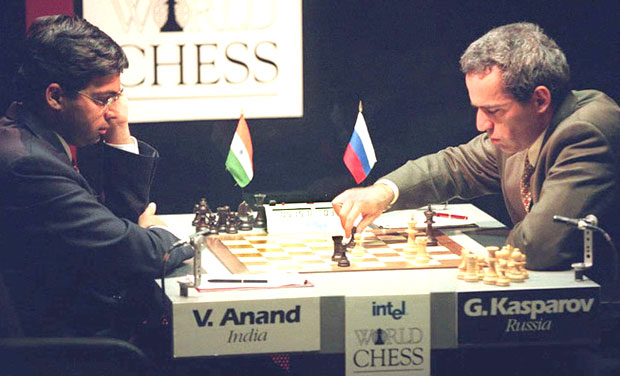
Mark Dvoretsky worked with Anand for six days before his 1995 World Championship Match with Kasparov
In the World Championship Match in 1995 this drawback really showed at a decisive moment. It was a very interesting situation for me. Anand had won the ninth game but lost the tenth one. It was almost impossible to stave off defeat against Kasparov because the man has such excellent opening preparation. Kasparov started to attack in the eleventh round by playing the new and never-played-before Dragon Variation. Anand on the other hand controlled everything well. He played a quiet line and did not engage in a theoretical discussion. Kasparov offered a draw, however Anand rejected it. It was not a simple position for Kasparov to play because he had to be precise to maintain equality. He lashed out and Anand could win a pawn and get a better position. It wasn't simple, it was necessary to calculate. However, it was not so difficult for a great player like Anand. Ten minutes of work and he would understand everything!
But Anand instantly made the move which lost the game. He couldn't force himself to think. It could have been possible if he would have worked on this shortcoming before the match in our training sessions. Maybe the result of the entire match would have been different, had Anand not blundered in that eleventh game.
Anand vs Kasparov, World Championship 1995, Game 11
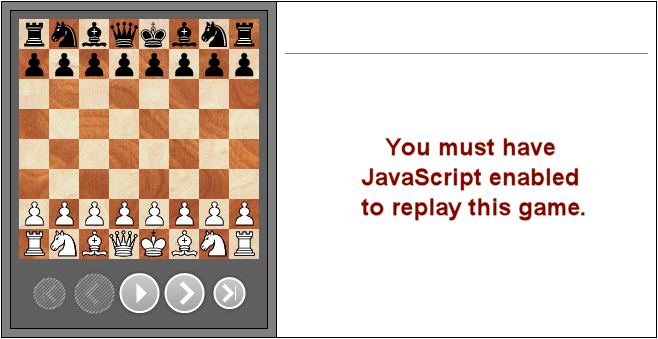
SS: Subsequently, Anand slowed down quite a bit, right?
MD: Of course, he became more mature and better in this area. But he had the chance to do that earlier. [Laughs]
SS: Did you work with Kasparov as well?
MD: I worked with Kasparov only in the Botvinnik school. It is clear that Garry was a fantastic talent. He organized his work on chess in a very systematic manner. He always had teams that helped him to prepare his openings very well. His understanding of the first phase of the game coupled with his hard work made him a fierce opening expert. He was aggressive and also a great tactician. On the other hand he didn't have the best of intuitions. If something went wrong in the opening he would get nervous, offer a draw or play some simple continuation. It is a pity because with his talent he could have solved the arising problems on the board. However, after years of hard work on the openings, he no longer trusted his intuition and wanted to know everything. But, when he was young he was able to solve such opening problems excellently. It was only later that he didn't trust his abilities fully.
SS: Tell us something about your training session with Veselin Topalov.

Topalov discusses one of the ongoing games with Mark at the Candidates 2016
MD: It was 1995. I visited the tournament in Novograd, because my former student and friend Artur Yusupov was playing there. At this event, Danailov, who was Topalov's manager, complained to me that Veselin had serious problems in the endgame. He didn't like to exchange pieces and refrained from going into an endgame even if it was profitable for him. I told him that it's not such a difficult problem to correct! [Laughs] They decided that Topalov should work with me and he came to Moscow. We had a ten-day session and Veselin worked very seriously.
SS: What was the schedule like?
MD: In the mornings we had three-hour session, then lunch and on some days we even went to the beach, where we continued our work. After this I gave him homework and he solved these exercises on his own at night. So it was several hours of work combined with homework. And believe it or not, his results improved tremendously after that. In one year, after our training, he gained 70-80 Elo points and he won a number of strong tournaments. Suffice it to say that endgame was not his weakness anymore!


Topalov's performance at the Candidates 2016 was lacklustre.
Here he is seen sharing his problems with Dvoretsky as Vladimir Potkin looks on.
SS: But do you think such a big weakness that has been in a player for so many years can be corrected in just ten days?
MD: We did it! [Laughs] Well, it was because I knew how this problem should be solved. Even less than ten days would have been sufficient according to me. When we started to work I saw that he was a tactician, but his calculation was not so great. He couldn't calculate well and could hardly solve the exercises. Hence, in the first couple days I explained to him the elements of rational technique of calculation. After that we completely switched to endgame, and then he was able to solve practically all the exercises.
With effective work you can make a huge difference, that's what I believe. Of course, he was a strong player and could understand the material quite well.
SS: Like Karpov, Kasparov and Anand, Topalov too was a natural talent?
MD: I can say that Topalov was extremely talented, but his level of talent was less than Kasparov or Karpov. That being said, it is extremely difficult to be at the top of the world rankings for so many years without having something special.
Part II of this interview will follow shortly. It will deal with Dvoretsky's tips on how to become stronger at middlegames, endgames, discussion about his favourite chess books and his approach towards writing. Mark also speaks about Magnus Carlsen, Bobby Fischer, famous trainers like Tukmakov, Chuchelov and treats us to some funny anecdotes.